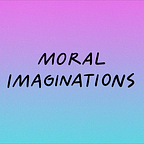Imagination Activism in Camden
We tell the story of Camden Imagines: building Imagination Activism in a local municipality, equipping council officers in the tools and practices of #collectiveimagination
Yesterday, Moral Imaginations launched a new report called Imagination Activism in Camden. It tells the story of our work with a London council to build “Imagination Activism” throughout the organisation, rippling out into the local borough to work with communities.
Over 8 weeks, Moral Imaginations trained 32 Camden council officers, from repairs to planners, in a course designed to expand their imaginations and equip them with tools to be ambassadors for the imagination within the organisation. People learned how to include future generations in decision-making, ask the question ‘What would Nature say, if Nature had a voice?’, and stand up to business as usual, building the confidence to speak up for what they believe matters.
- To download the report, click here.
- To read the report and watch a video about the project on our website, visit this link.
Imagination Activism is an approach which trains people to build and stretch their imaginations to think and see differently and create new systems from those perspectives. It is about shifting perception and translating that into action that wasn’t previously deemed possible.
You can find the key findings below. The training unleashed a wave of energy and change throughout the council, built psychological safety, and grew long-term, ethical thinking. We are now working with Camden to embed this thinking into the governance of the organisation, bringing future generations, nature and ancestors into decision making, and expanding out the training to others, including Camden’s senior leadership, to continue building the movement.
The report makes the case for growing municipal imagination, as a necessity of imagination justice — as it’s not just what we imagine but who gets to imagine. It shows imagination can be a tool for growing social movements and internal change and it offers a blueprint that could be replicated in other local councils and organisations. Many working in civil society don’t feel they have permission to create space for this kind of work. This report argues that they should.
The top findings of the report
Here are the top five insights that we share about in the report:
- Exercising collective imagination is deeply linked to a sense of psychological safety. This design principle underpinned the entirety of the programme, and almost 70% participants reported an increased sense of psychological safety, and 100% reported an increase in imagination capacity.
- Imagination can be integrated into a professional setting, providing tools and practices that have practical relevance to the day-to-day work of a civil servant. All participants reported feeling equipped with practical, relevant tools, which goes against the assumption that imagination is ‘fluffy’ or impractical.
- Imagination has a role to play in local government, policy-making and civic innovation, introducing new perspectives and an expanded worldview, and could and should be seen as a core capability of 21st century local government leadership. What if all council officers had access to these tools and practices?
- Imagination practice can help energise a new kind of activism, which focuses on imagining how things could be, and implementing the changes needed to get there. This is complementary to traditional activism and has the potential to unleash huge amounts of energy, and turn meetings into a movement.
- Imagination is often seen as something frivolous or soft, but its application towards social change can be rigorous and powerful, and key in shifting worldviews, changing culture and energising movements.
We are really excited about the momentum that has been unlocked and the ripples out to the ecosystem. If you would be interested in partnering with us, including funding this work, please get in touch. If you would like to bring imagination activism to your local council, please get in touch.
To share publicly about the project and work, click here for a post on Twitter and Linkedin.
If you want to read more about what we have been doing, here are some additional links:
- Visit the Camden Imagines blog where you can find the 20 blogposts from Camden’s Imagination Activists
- Read two blogposts about this work: Imagination is not day-dreaming, and An invitation for local government to invest in municipal imagination
- Explore Camden’s visionary strategy document: We Make Camden, outlining the missions for the borough
- Listen to Rob Hopkins’ podcast episode where Phoebe and Cllr Georgia Gould discuss the project: From What If to What Next: Episode 69 — What if every institution ran Imagination Activist training?
Thank you to Camden Council for sponsoring this work and partnering with us, who have been a joy and privilege to work with. A special thanks to the 32 Imagination Activists, who stepped into the unknown with great courage and vulnerability, and the Camden leadership for having the vision to support this work, to Jo and Nick and the entire project team without whom none of this would have happened.
We’d also like to thank our advisory council Daze Aghaji, Jon Alexander, Nora Bateson, Rob Hopkins, Christine Lai, Anthea Lawson, and Alison Tickell in their continued support in taking this work forward.
If you’d like to stay in the loop on the developments of the next phase of work, or contact us, please sign up to the Moral Imaginations newsletter.
